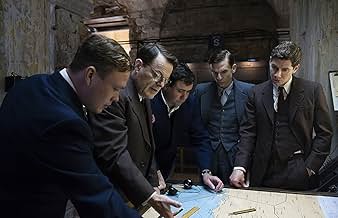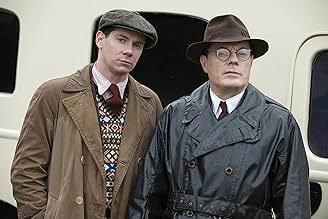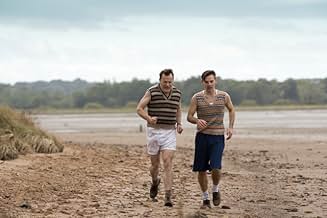IMDb RATING
6.8/10
1.3K
YOUR RATING
Eddie Izzard stars in this funny, moving and inspiring factual drama about the pioneering work on radar by a little known team of scientists in the run up to the Second World War.Eddie Izzard stars in this funny, moving and inspiring factual drama about the pioneering work on radar by a little known team of scientists in the run up to the Second World War.Eddie Izzard stars in this funny, moving and inspiring factual drama about the pioneering work on radar by a little known team of scientists in the run up to the Second World War.
- Awards
- 2 nominations total
Neal Stewart-Roxburgh
- The 7th Boffin
- (uncredited)
- Director
- Writer
- All cast & crew
- Production, box office & more at IMDbPro
Featured reviews
Not knowing much about how radar came about (although knew of the significance) and being a fan of Mr Izzard I was keen to watch this docu-drama. They were honest from the start saying this was based on true events, but the events you see have been made up for TV. Well, that's fine and fair enough.
But as soon as it started I felt my attention slip, Eddie Izzard was good, his accent went from Scottish to American can back again which I found funny. But he came across as a nice enough chap enthusiastic about his job. I didn't care much for his wife, and assumed that they didn't have children but lived that experience through his nephew?! That's when it hit me, if these things matter I clearly am not enjoying this programme.
I fast found myself confused by who everyone was, what became of the mole, or the guys who worked for him. I didn't care much about Robert's personal circumstances and was surprised he was surprised things didn't go according to plan. His team were good sorts, but I guess they all enlisted bar one?! I don't know I was out of the room at that time.
I understand the writers didn't really know how they got to a successful radar station, but the "eureka" moments were plain dull. I had hoped that Taffy was having a flash back from WW1 and was going to put them all in jeopardy. But no...
I wanted to like this, but it was just too dull, like boiled meat and potatoes. Shame for something so momentous and unsung. If you don't know about the birth of radar and don't want to be spoken at for an hour, this will give you all you need to know in a softer 1 ½ hours.
But as soon as it started I felt my attention slip, Eddie Izzard was good, his accent went from Scottish to American can back again which I found funny. But he came across as a nice enough chap enthusiastic about his job. I didn't care much for his wife, and assumed that they didn't have children but lived that experience through his nephew?! That's when it hit me, if these things matter I clearly am not enjoying this programme.
I fast found myself confused by who everyone was, what became of the mole, or the guys who worked for him. I didn't care much about Robert's personal circumstances and was surprised he was surprised things didn't go according to plan. His team were good sorts, but I guess they all enlisted bar one?! I don't know I was out of the room at that time.
I understand the writers didn't really know how they got to a successful radar station, but the "eureka" moments were plain dull. I had hoped that Taffy was having a flash back from WW1 and was going to put them all in jeopardy. But no...
I wanted to like this, but it was just too dull, like boiled meat and potatoes. Shame for something so momentous and unsung. If you don't know about the birth of radar and don't want to be spoken at for an hour, this will give you all you need to know in a softer 1 ½ hours.
The story of Robert Watson Watt, a pioneer, who helped enormously in Britain's war effort.
I liked the humour, feel and spirit of it, it was a light hearted take, on what's quite a serious story, I'm not sure about how much of it was historically accurate, but the story itself is fascinating, and if you're interested in this piece of history, it's worth reading up.
Some nice touches of humour, the scenes on the beach were food fun, such a contrast to the authentic footage of the Nazis, chilling still to watch.
A wonderful cast assembled here, Eddie Izzard and Julian Rhind Tutt were both great, Tim McInnery, great actor, but not the right fit for Churchill.
It's worth seeing, 7/10.
I liked the humour, feel and spirit of it, it was a light hearted take, on what's quite a serious story, I'm not sure about how much of it was historically accurate, but the story itself is fascinating, and if you're interested in this piece of history, it's worth reading up.
Some nice touches of humour, the scenes on the beach were food fun, such a contrast to the authentic footage of the Nazis, chilling still to watch.
A wonderful cast assembled here, Eddie Izzard and Julian Rhind Tutt were both great, Tim McInnery, great actor, but not the right fit for Churchill.
It's worth seeing, 7/10.
With war against Germany approaching, the British government sends out a request for a death ray. Robert Watson Watt (Eddie Izzard) suggests something else, radar. Instead of the stuffy professors from the highest universities, he recruits other weathermen. The program faces opposition from his superior Lindemann with Churchill calling it building castles in the sky.
Not every story can be dramatized and this movie tries its hardest. The small guy against the world is always a good angle. All of that works very well. The technical aspect of radar is explained but the drama isn't that dramatic. I'm reminded of squeezing an orange to explain the nuclear bomb. His married life is probably the least appealing. It diminishes his wife. It's almost more compelling to have her fade into the background which would justify her leaving. As for the acting, these are experienced veterans. Eddie Izzard is solid. Tim McInnerny is playing Churchill which I wouldn't be able to guess. He's a little skinny for the role. Overall, it tries hard to be dramatic and works well enough.
Not every story can be dramatized and this movie tries its hardest. The small guy against the world is always a good angle. All of that works very well. The technical aspect of radar is explained but the drama isn't that dramatic. I'm reminded of squeezing an orange to explain the nuclear bomb. His married life is probably the least appealing. It diminishes his wife. It's almost more compelling to have her fade into the background which would justify her leaving. As for the acting, these are experienced veterans. Eddie Izzard is solid. Tim McInnerny is playing Churchill which I wouldn't be able to guess. He's a little skinny for the role. Overall, it tries hard to be dramatic and works well enough.
Eddie Izzard seemed like a curios choice, at first, but he does a terrific job in this movie. It proves to be a great lesson in the importance of achievements from the farthest corners of Britain during WWII.
A local theatre has been showing little-known WW II films this month (August 2015) on the 70th anniversary of the end of that war, and this film on the British development of radar for the RAF prior to WW II was one of them. I'm interested in the historical development of technology plus I had seen a PBS Nova show several years ago on WW II's spur to radar's development, so I was interested in this BBC production. In addition, Ian Kershaw, a well-respected British historian, wrote the script. I was not disappointed; it was a very enjoyable film for me.
I had also seen earlier this year "The Imitation Game" featuring Alan Turing and his team of British mathematicians and codebreakers at Bletchley Park, and the parallels with "Castles" are striking. Both films have groups of unconventional geniuses monitored by class-conscious representatives of Britain's ruling circles and sequestered in rural hideaways where they work under great pressure to help win the war ("Imitation") or prepare for war ("Castles"). Robert Watson Watt, played by Eddie Izzard, is the Alan Turing of "Castles", and although not as eccentric as Turing, is sufficiently unconventional to warrant suspicion and doubt by those in the British government in the late-30s who must trust him with their scarce resources. His idea is to use a series of radio beams: (1) of sufficient strength to echo off incoming objects, e.g., bombers, at a sufficient distance, (2) and of sufficient number to ascertain their direction. The senior officials want him to use the nation's top physicists from Oxford and Cambridge to assist him, but Watt is an engineer for the Meteorological Service and wants to use his fellow "weather engineers" who can think outside-the-box. He gets his way against the rigid class structure of pre-war Britain, and for my money the visible drama of demonstrating radar's efficacy in detecting planes from 60 miles out (as shown in "Castles") is more striking than the drama that unfolds in "Imitation" where the group is finally able to read a coded message. The end of "Castles" shows how well radar has been integrated into RAF's Fighter Command by taking us inside their command centers that are ready to scramble fighters at the first ping on the radarscope on the eve of the Battle of Britain (when the Luftwaffe had three times as many planes at the outset).
Modern wars, for better or worse, are said to be won with economic production and technology, and it's thus gratifying to see little-known figures like Watt featured in a film like this. It's sad to compare, however, that Watt was rewarded with a knighthood in 1942 for his pre-war development of radar, while Turing, pledged to secrecy by the British government for his war-time codebreaking, was not honored during his lifetime and apparently committed suicide.
I had also seen earlier this year "The Imitation Game" featuring Alan Turing and his team of British mathematicians and codebreakers at Bletchley Park, and the parallels with "Castles" are striking. Both films have groups of unconventional geniuses monitored by class-conscious representatives of Britain's ruling circles and sequestered in rural hideaways where they work under great pressure to help win the war ("Imitation") or prepare for war ("Castles"). Robert Watson Watt, played by Eddie Izzard, is the Alan Turing of "Castles", and although not as eccentric as Turing, is sufficiently unconventional to warrant suspicion and doubt by those in the British government in the late-30s who must trust him with their scarce resources. His idea is to use a series of radio beams: (1) of sufficient strength to echo off incoming objects, e.g., bombers, at a sufficient distance, (2) and of sufficient number to ascertain their direction. The senior officials want him to use the nation's top physicists from Oxford and Cambridge to assist him, but Watt is an engineer for the Meteorological Service and wants to use his fellow "weather engineers" who can think outside-the-box. He gets his way against the rigid class structure of pre-war Britain, and for my money the visible drama of demonstrating radar's efficacy in detecting planes from 60 miles out (as shown in "Castles") is more striking than the drama that unfolds in "Imitation" where the group is finally able to read a coded message. The end of "Castles" shows how well radar has been integrated into RAF's Fighter Command by taking us inside their command centers that are ready to scramble fighters at the first ping on the radarscope on the eve of the Battle of Britain (when the Luftwaffe had three times as many planes at the outset).
Modern wars, for better or worse, are said to be won with economic production and technology, and it's thus gratifying to see little-known figures like Watt featured in a film like this. It's sad to compare, however, that Watt was rewarded with a knighthood in 1942 for his pre-war development of radar, while Turing, pledged to secrecy by the British government for his war-time codebreaking, was not honored during his lifetime and apparently committed suicide.
Did you know
- GoofsThe aircraft in the initial test is of the right era but the wrong type - it looks like a de Havilland Rapide, while it should be a Handley Page Heyford, something in which the film makers had little choice, since not a single example of a Heyford survives, flying or not.
- ConnectionsReferenced in Six Minutes to Midnight: Behind the Scenes (2020)
Details
- Runtime
- 1h 30m(90 min)
- Color
Contribute to this page
Suggest an edit or add missing content






























